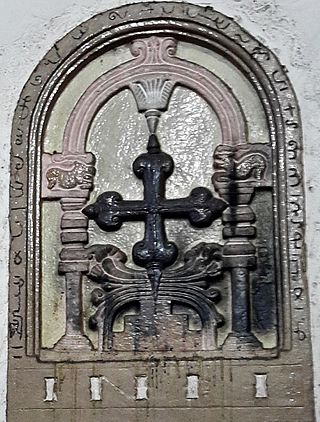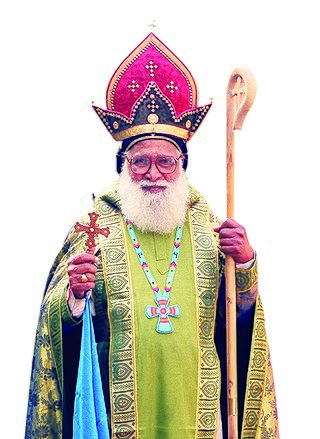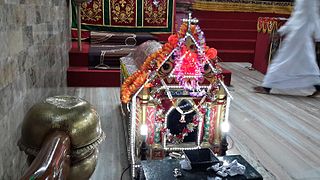
Malayalam is a Dravidian language spoken in the Indian state of Kerala and the union territories of Lakshadweep and Puducherry by the Malayali people. It is one of 22 scheduled languages of India. Malayalam was designated a "Classical Language of India" in 2013. Malayalam has official language status in Kerala, Lakshadweep and Puducherry (Mahé), and is also the primary spoken language of Lakshadweep and is spoken by 35 million people in India. Malayalam is also spoken by linguistic minorities in the neighbouring states; with a significant number of speakers in the Kodagu and Dakshina Kannada districts of Karnataka, and Kanyakumari, Coimbatore and Nilgiris district of Tamil Nadu. It is also spoken by the Malayali Diaspora worldwide, especially in the Persian Gulf countries, due to the large populations of Malayali expatriates there. They are a significant population in each city in India including Mumbai, Bengaluru, Chennai, Delhi, Hyderabad etc.

The Saint Thomas Christians, also called Syrian Christians of India, Marthoma Suriyani Nasrani, Malankara Nasrani, or Nasrani Mappila, are an ethno-religious community of Indian Christians in the state of Kerala, who, for the most part, employ the Eastern and Western liturgical rites of Syriac Christianity. They trace their origins to the evangelistic activity of Thomas the Apostle in the 1st century. The Saint Thomas Christians had been historically a part of the hierarchy of the Church of the East but are now divided into several different Eastern Catholic, Oriental Orthodox, Protestant, and independent bodies, each with their own liturgies and traditions. They are Malayalis and their mother tongue is Malayalam. Nasrani or Nazarene is a Syriac term for Christians, who were among the first converts to Christianity in the Near East.

The Malankara Mar Thoma Syrian Church, often shortened to Mar Thoma Church, and known also as the Reformed Syrian Church and the Mar Thoma Syrian Church of Malabar, is an autonomous Oriental Protestant Christian church based in Kerala, India. While continuing many of the Syriac high church practices, the church is Protestant in its theology and doctrines. It employs a reformed variant of the West Syriac Rite Divine Liturgy of Saint James, translated to Malayalam.

Deepika is an Indian Malayalam-language newspaper, which is one of the oldest newspapers published in India. Started in 1887, it is the oldest Malayalam newspaper now in circulation. Deepika publishes editions from Kottayam, Kochi, Kannur, Thrissur, Thiruvananthapuram and Kozhikode.

Philipose Mar Chrysostom Mar Thoma XX was an Indian prelate who served as Metropolitan of the Malankara Mar Thoma Syrian Church from 1999-2007 and Valiya Metropolitan from 2007 until his death. He was the world's longest serving bishop, serving for −67 years, 11 months and 12 days. He was addressed and referred to as Chrysostom Thirumeni or Valiya Thirumeni after his retirement. He was also a known humorist. He was awarded India's third highest civilian award, the Padma Bhushan, in 2018.
Mar Thoma V was the 5th Malankara Metropolitan who served puthenkoor from 1728 to 8 May 1765. He was born as Ousep to the Pallippuram branch of the Pakalomattom family, situated in Andoor, Marangattupilly, where his father served as administration chief of Vadakkumkur Kings. He was ordained in 1728 and served as Malankara Metropolitan for 37 years until his death on May 8, 1765. His final resting place is Niranam St. Mary’s Church. His tenure faced numerous challenges and conflicts with bishops sent from the Syriac Orthodox Patriarchate in Antioch, resulting in some of these Syriac bishops being banished from the country and forced to return.
Mar Thoma VII was a Bishop of the Malankara Church from 1796 and the 7th Malankara Metropolitan from April 1808 to July 1809. Born in Pakalomattom family in Kurichithanam, Pala, he was well known as an efficient administrator, deeply religious but was a quiet and reserved person. During his time, a difficult period in the history of Travancore State, the church was able to help Travancore government by depositing an amount as fixed deposit, which came to be known as Vattipanam.

Mar Thoma IX was the ninth Metropolitan of the Malankara Church in Kerala, India for a brief period in 1816. That year, he was consecrated Metropolitan by Mar Thoma VIII, but soon after his ordination he was dethroned by Pulikkottil Joseph who was appointed by the then British resident Colonel John Munroe.
Mar Dionysius II, born Pulikkottil Joseph Ittoop was 10th Malankara Metropolitan for nine months until his death on 24 November 1816. He dethroned Mar Thoma IX and succeeded him by the favour of Col.John Munroe, then British Resident of Travancore. Despite the brevity of his reign he made lasting contributions to the Malankara Orthodox Syrian Church.

Mar Emmanuel Nidhiri, also known as Nidhiry Mani Kathanar, was a significant figure in the history of the Syrian Malabar Nasrani church in Kerala. He led the community against the European hegemony over the Saint Thomas Christians and was accepted by the factions in the Kerala church. Nidhiri was the second Vicar General of the Syro-Malabar Catholic Church.
Kattakayam Cherian Mappillai (1859–1936) was an Indian poet and playwright of Malayalam literature. He was known for the epic poem Shreeyeshu Vijayam, which earned him the title of Mahakavi. He was the founder editor of Vijnaana Rathnaakaram, one of the earliest literary magazines in Malayalam language. Pope Pius XI presented him a gold medal in 1931.

The Jacobite Syrian Christian Church, or the Syriac Orthodox Church in India, is a Maphrianate of the Syriac Orthodox Church of Antioch based in Kerala, India and part of the Oriental Orthodox Church. It recognizes the Syriac Orthodox patriarch of Antioch and All the East as supreme head of the church. It functions autonomously within the church as an archdiocese, administered by the Malankara Metropolitan, Gregorios Joseph, and comes under the authority of the Catholicos of India, Baselios Thomas I. Following schism with the Malankara Orthodox Syrian Church, it is currently the only church in Malankara that is under the administrative supervision of Syriac Orthodox Church. The church employs the West Syriac Rite Liturgy of Saint James.

Kannamcode Cathedral or Kannamcode St. Thomas Orthodox Cathedral is one of the oldest churches in Central Travancore. The church belongs to the Malankara Orthodox Syrian Church under 'Adoor-Kadampanad' diocese. Kannamcode Cathedral is situated in Adoor, a town in Pathanamthitta district of the Indian state of Kerala. Adoor has a large population of Syrian Christians. Christianity in this locality has a tradition of more than a millennium and a half years, beginning from the village of Kadampanad. St. Thomas Orthodox Cathedral, Kannamcode, a very old Church in central Travancore, has a history of approximately 900 years, belonging to the Malankara Orthodox Syrian Church under 'Adoor-Kadampanad' diocese. Kannamcode. At Kadampanad the age of early Christian community dates back to 4th century A.D about two centuries later than the arrival of St. Thomas on the Kerala coast. Prior to the building of this church, the Christian community had to depend on near-by churches - Thumpamon Orthodox Church and third Kannamcode Cathedral to full fill their Christian services and spiritual needs. The people had to walk quite a bit of distance to attend church services and return to their village and it appeared to be tedious. Upon getting necessary permission and support from the local Hindu kings of Kayankulam, at last, a church came into being then called Veerappallil Yakoba Palli", later renamed as Kannamcode St. Thomas Orthodox Church. The same church is presently known as Kannamcode St. Thomas Orthodox Cathedral.

St. George's Syro-Malabar Forane Church, locally known as Edapally Church is a Catholic pilgrimage church in Edapally, Kochi, India. It is considered as Asia's largest shrine dedicated to Saint George, about five million people visit it every year.

Religion in Kerala is diverse. According to 2011 census of India figures, 54.73% of Kerala's population are Hindus, 26.56% are Muslims, 18.38% are Christians, and the remaining 0.33% follow other religions or have no religion. As of 2020, Hindus, Muslims, Christians and others account for 41.5%, 43.9%, 13.9% and 0.7% of the total child births in the state, respectively.
The Angamaly Firing was an incident that took place in Angamaly, Kerala, on 13 June 1959, when police opened fire on protesters who had been demonstrating against Kerala's communist government. Seven people were killed resulting in the intensification of Vimochana Samaram, a protest against the then communist led government.

Benny Daniel, better known by his pen name Benyamin, is an Indian writer in Malayalam from Kerala. He is the author of about thirty books in various genres – from short stories to novels and memoirs. For his novel Goat Days (Aadujeevitham), he won the Abu Dhabi Sakthi Award, Kerala Sahitya Akademi Award and JCB Prize, and was shortlisted for the Man Asian Literary Prize. The novel Manthalirile 20 Communist Varshangal won the Vayalar Award in 2021.

Aadujeevitham is a 2008 Malayalam-language novel by Indian author Benyamin. It is about an abused Malayali migrant worker employed in Saudi Arabia as a goatherd against his will.
Suriyani Malayalam, also known as Karshoni, Syro-Malabarica or Syriac Malayalam, is a dialect of Malayalam written in a variant form of the Syriac alphabet which was popular among the Saint Thomas Christians of Kerala in India. It uses Malayalam grammar, the Maḏnḥāyā or "Eastern" Syriac script with special orthographic features, and vocabulary from Malayalam and East Syriac. This originated in the South Indian region of the Malabar Coast. Until the 19th century, the script was widely used by Syrian Christians in Kerala.

Several historical evidences shed light on a significant Malankara–Persian ecclesiastical relationship that spanned centuries. While an ecclesiastical relationship existed between the Saint Thomas Christians of India and the Church in Sassanid Empire in the earlier centuries, closer ecclesiastical ties developed as early as seventh century, when India became an ecclesiastical province of the Church of the East, albeit restricted to matters of purely ecclesiastical nature such as ordination of priests, and not involved in matters of temporal administration. This relationship endured until the Portuguese protectorate of Cochin of Malabar came to be in 16th century, and the Portuguese discovery of a sea route to India. The Christians who came under the two ancient yet distinct lineages of Malankara and Persia had one factor in common: their Saint Thomas heritage. The Church of the East shared communion with the Great Church until the Council of Ephesus in the 5th century, separating primarily over differences in Christology.













